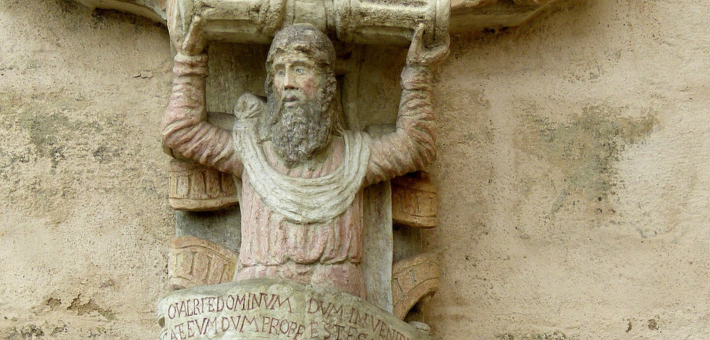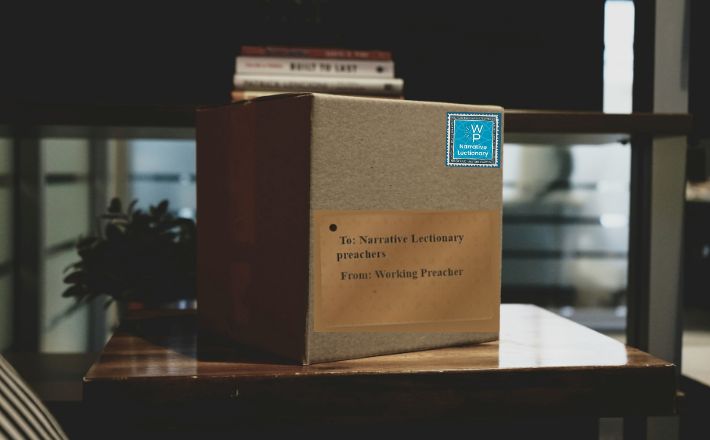Commentary on Isaiah 55:1-13
Isaiah 55 is a sales pitch wrapped in poetry. Imagine a hot Middle Eastern day, with the sounds and smells of a lively market everywhere—animals, bartering, and the shuffles of feet. One voice stands out above the din, seizing your attention.
The pitch is well constructed and includes four key elements:
- a clear call to action (“Come to the waters,” “Buy and eat!,” “Buy wine and milk,” verse 1)
- a guarantee that the products are a bargain (“without money and without price,” verse 1)
- a comparison with inferior products (“Why do you spend your money for that which is not bread, and your labor for that which does not satisfy?,” verse 2), and
- an appetizing description of the product (“eat what is good, and delight yourself in rich food,” verse 2).
But the truth is, the prophet is peddling something far less mundane than wine, milk, and bread. What he has on offer is nourishing but in a very different kind of way.
Speaking on behalf of Israel’s Creator, the prophet offers an “everlasting covenant, my steadfast, sure love for David” (verse 3). Key to understanding this promise is the rich and complex narrative of King David. He is a key royal figure in Israel’s history and the privileged recipient of YHWH’s promises (see 2 Samuel 7). According to Isaiah 55’s interpretation of that history, David was a “witness,” “leader,” and “commander” (verse 4).
In the imagination of the poet, David’s individual history holds the key to Israel’s collective future. King David was a leader among his own people, and hundreds of years later, his people were somehow to emerge as leaders among the nations. Shockingly, Isaiah 55 states that this despondent and defeated people could once again be “glorified” (verse 5), like their ancient ancestor David.
This is an audacious and remarkable claim, given that the Jews of this era had very little political power, diminished collective wealth, and a degraded ability to govern themselves. They were a conquered people, whose hopes for the future were precarious at best.
To this weary and diminished people, the prophet dares to proclaim that “nations” will run to them (verse 5). In this vision of the future, Israel no longer shrinks before the nations but calls them forth—drawing the peoples of the earth not through conquest or coercion, but through restored dignity.
Isaiah 55 subtly echoes the rhetorical style and content of ancient Near Eastern imperial propaganda, in which kings boasted that foreign peoples streamed to their capitals to pay tribute and obeisance (see also Isaiah 60). Here, however, the prophet turns that imagery on its head: From its humbled and defeated city of Jerusalem, Israel would one day occupy a similar place of prestige and prominence among the nations. A people at the edges of political power would find itself at its very center.
Isaiah’s audience would radiate that light not from the land of their conqueror, Babylon, but from their own ancestral grounds, to which they will return with joy and celebration (verses 12–13). In this great reversal, “the thorn” and “the briar” will be replaced by “the cypress” and “the myrtle” (verse 13)—a memorial and sign of a durable and hopeful future. Exile gives way to restoration, scarcity gives way to abundance, and sorrow gives way to hope.
This poem is clearly meant to stoke hope in dreary times. But its author also recognizes the importance of agency, especially in the wake of disruption and trauma: “Seek … call upon … forsake … return” (verses 6–7). Isaiah 55’s audience was not simply called to wait around for the rain to fall (verses 10–11). The poet conjures their participation in repairing the past and constructing the future. They are not powerless, and neither are they alone.
In a mere handful of verses, the poem traverses remarkable emotional, literary, and theological terrain. The promised “bread,” “milk,” and “wine” are far more than provisions for the body; they are rich metaphors for a despondent community’s deeper needs for purpose, reconciliation, and homecoming.
Isaiah 55 provides fertile ground for preachers and teachers who also need words of hope for their communities, whose members are, right now, experiencing differing levels of despair, displacement, and hopelessness. The poem offers not only content but a model. Human beings need to hear from the outside—from voices other than their own—that they are precious, valuable, and loved. They need to know there is a future for them, but they also need to know they have a role in bringing that future about. In the context of defeat and despair, both promise and agency matter.
PRAYER OF THE DAY
God of restoration,
Save us when we find ourselves spiritually thirsty. Help us walk your road with your purpose, strengthened by your living water. Amen.
HYMNS
Lo, how a rose e’er blooming ELW 272, H82 81, UMH 216, NCH 127
My song is love unknown ELW 343, H82 458, NCH 222
CHORAL
He came down, Marty Haugen



December 14, 2025